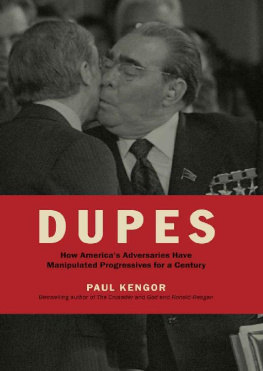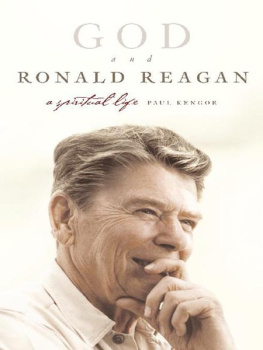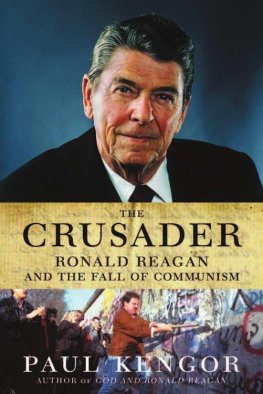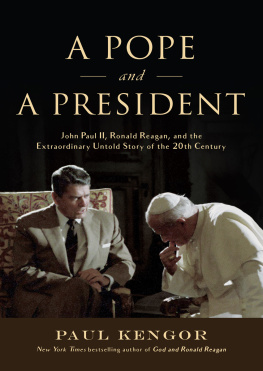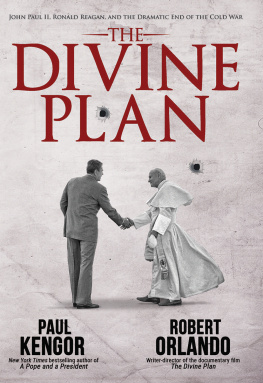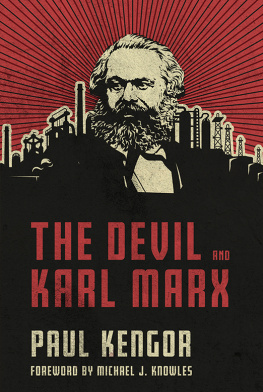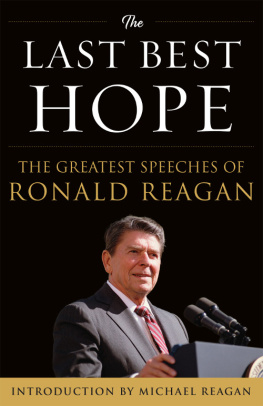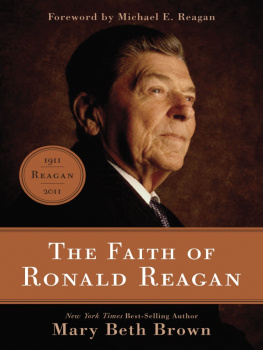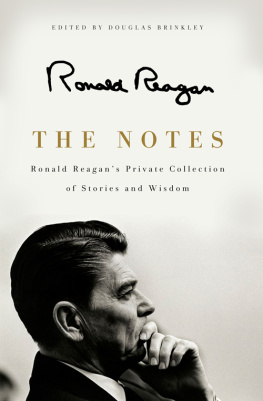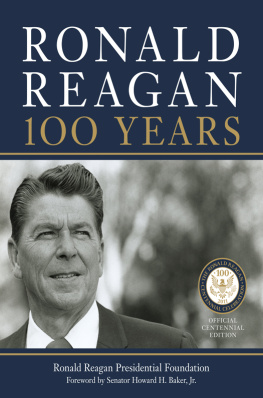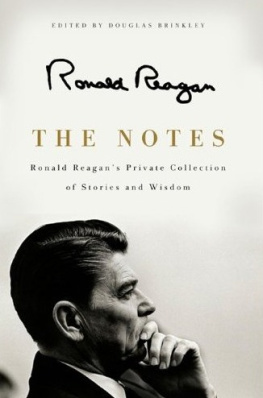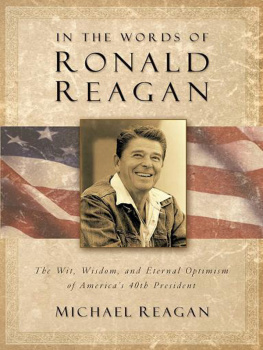Praise for
11 Principles of a Reagan Conservative
A clear, concise outline of President Reagans approach to politicsand a roadmap to victory for todays conservatives.
~ Herb Meyer, Special Assistant to the Director of Central Intelligence and Vice Chairman of the CIAs National Intelligence Council during the Reagan Administration
Paul Kengor has done a great job and great service capturing the essence of Reagans economic ideals. As someone involved with Reaganomics, and particularly tax cuts, I am especially pleased with Kengors treatment of the subject. We need to properly understand what happened under Ronald Reagan in the 1980smost notably, the enduring value of his tax cuts, which were a cornerstone of Reagan conservatism. This book gets it right. Nicely done.
~ Dr. Arthur B. Laffer, the founder and chairman of Laffer Associates, an economic research firm
Paul Kengor has written an elegant primer on what Ronald Reagan believed, how he implemented so much of what he believed, and how it benefited the Republic. Here is essential reading for all who would vote for a better America.
~ R. Emmett Tyrrell, Jr., founder and editor-in-chief of The American Spectator
This succinct statement of the PRINCIPLES OF A REAGAN CONSERVATIVE, presented with a highly laudatory preface by Edwin Meese III, is sharp and well conceived. In this season, while we wait and pray for another Reagan, now in a time as dire as when Reagan took office amid domestic and foreign crises of the worst sort, this book will help us sort out the wheat from the chaff. It is not ideological purity that Reagan sought, but fidelity to practical, well-tested and proven principles. So many were against him, derisive and mocking. He smiled at them and continued in his quiet, courageous way, all the while careful never to violate the Eleventh Commandment: Speak ill of no other conservativeit takes all types.
~ Michael Novak, 1994 Templeton Laureate
What is a Reagan conservative? Thats a question that I, as a Reagan conservative and a Reagan biographer, get asked frequently. Its also a question that few self-described conservatives truly understand. And yet, with all the books on Ronald Reagan, this is the first to undertake an answer. Paul Kengor, himself a Reagan conservative, lays out 11 principles of Reagan conservatism. This book couldnt be more timely and more needed as conservatives look desperately for the next generation of genuine Reagan conservatives.
~ Craig Shirley, Reagan biographer and New York Times best-selling author
There are few historians who are closer students of the Reagan message, his thoughts, his utterances, and his convictions than Paul Kengor. In this primer of Reagan principles, Kengor offers us the heart of the Reagan vision.
~ Bill Bennett, Former U.S. Secretary of Education and host of Morning in America
Its really a handy volume for the young people who wont read longer ones. Paul Kengor reminds us of the building blocks of successful modern conservatism. He adds and multiplies to bring us back together with Ronald Reagans basic principles that are unifying for all of us. Paul Kengor reminds us of what ties us together. His discussion of Ronald Reagans principles will inspire future generations to come together and promote a true conservative future. Kengor is a noted authority on Ronald Reagan. This slim volume distills the principles of Reagan for future generations to learn and apply for rebuilding a free society.
~ Ed Feulner, retired president of The Heritage Foundation
11 Principles of a Reagan Conservative
Paul Kengor

Copyright 2014 by Paul Kengor
FIRST EDITION
All rights reserved. No part of this book may be reproduced in any form or by any electronic or mechanical means, including information storage and retrieval systems, without permission in writing from the publisher, except by a reviewer who may quote brief passages in a review.
Library of Congress Cataloging-in-Publication Data
Kengor, Paul, 1966
11 principles of a Reagan conservative / Paul Kengor, PhD.
First edition.
pages. cm.
Includes bibliographical references.
ISBN 978-0-8253-0699-0 (pbk. : alk. paper)
1. ConservatismUnited States. 2. ConservatismUnited StatesPhilosophy. 3. Reagan, RonaldInfluence. 4. United StatesPolitics and government. I. Title. II. Title: Eleven principles of a Reagan conservative.
JC573.2.U6K46 2014
320.520973dc23
2013036764
For inquiries about volume orders, please contact:
Beaufort Books
27 West 20th Street, Suite 1102
New York, NY 10011
sales@beaufortbooks.com
Published in the United States by Beaufort Books
www.beaufortbooks.com
Distributed by Midpoint Trade Books
www.midpointtrade.com
Printed in the United States of America
Interior design by Vally Sharpe
Cover Design by Howard Grossman
Also by the Author
All the Dupes Fit to Print: Journalists Who Have Served
as Tools of Communist Propaganda
The Communist: Frank Marshall Davis,
the Untold Story of Barack Obamas Mentor
Dupes: How Americas Adversaries Have
Manipulated Progressives for a Century
The Crusader: Ronald Reagan and the Fall of Communism
The Judge: William P. Clark, Ronald Reagans Top Hand
(with Patricia Clark Doerner)
God and Ronald Reagan: A Spiritual Life
God and George W. Bush: A Spiritual Life
God and Hillary Clinton: A Spiritual Life
The Reagan Legacy: Assessing the Man and His Presidency
(with Peter Schweizer)
Wreath Layer or Policy Player?
The Vice Presidents Role in Foreign Policy
Contents
by Edwin Meese III
Foreword
By Edwin Meese III
When Ronald Reagan was inaugurated as president on January 20, 1981, he was immediately confronted by one of the most daunting combinations of challenges ever faced by a newly elected chief executive. On the domestic scene, the nation was gripped by the worst economic crisis since the Great Depression. Record high inflation and massive unemployment created a misery index of unprecedented proportions. An energy shortage and accelerating gasoline prices affected the well-being of families and businesses alike.
In terms of national security, the situation was equally bleak. In the aftermath of the Vietnam War, our military capability had eroded dramatically and the United States was too often regarded as neither a credible deterrent to our enemies nor a reliable ally to our friends. At the same time, the Soviet Union was adopting a more aggressive posture, endangering smaller governments throughout the world while it continued its cruel oppression of the captive nations behind the Iron Curtain. Increasing world tensions and the threat of nuclear war were an ever-present menace.
At home, the dire economic conditions, the deteriorating international situation, and the seeming inability of the federal government to cope with a massive array of problems, had seriously affected the publics confidence in our nation and its institutions. The outgoing president had even proclaimed that the people were in a malaise.
President Reagan responded with a new message, a new strategy, and a new direction for the nation. In this new, national forum he repeated a theme that he had championed as governor of California and in innumerable political speeches. He recalled the principles and values of our countrys founders, which had been the foundation for Americas success in the past. He promised to launch what he called a bold, forward-looking, conservative agenda, based on that foundation. He assured the nation, I have seen the conservative future and it works.


